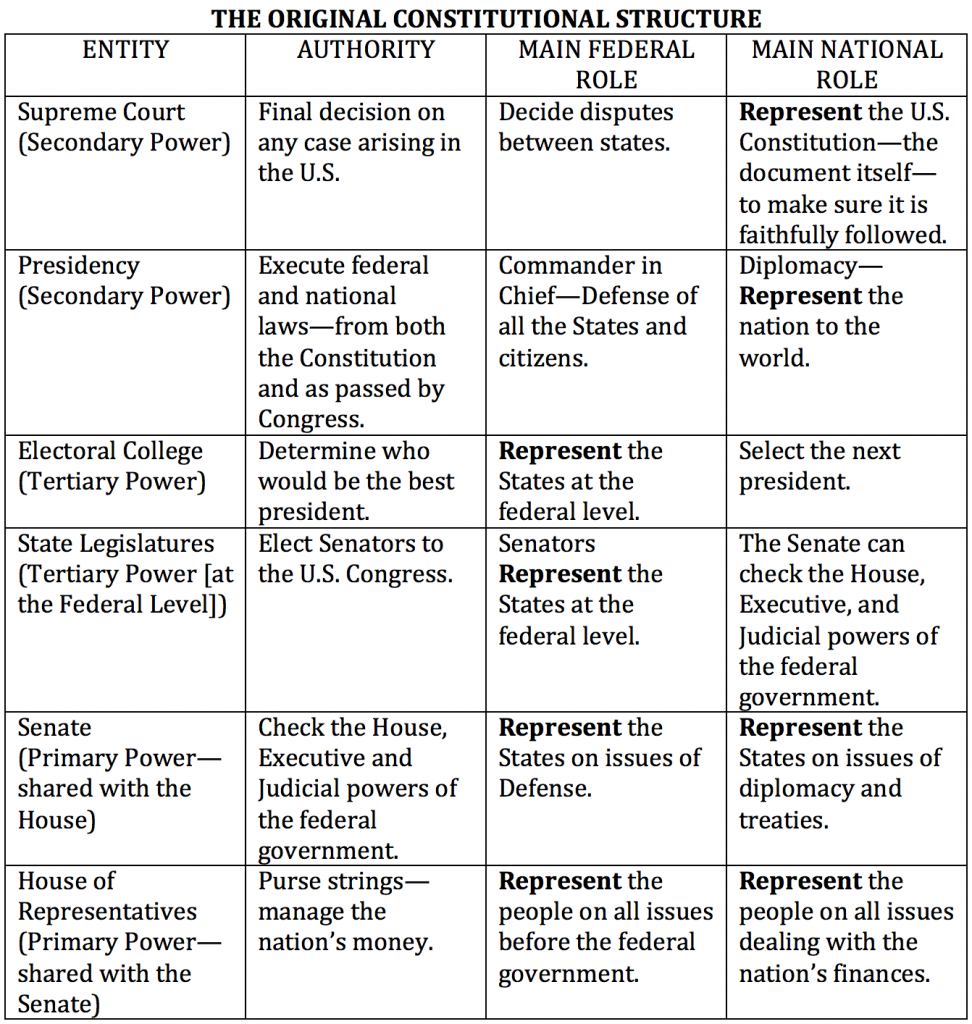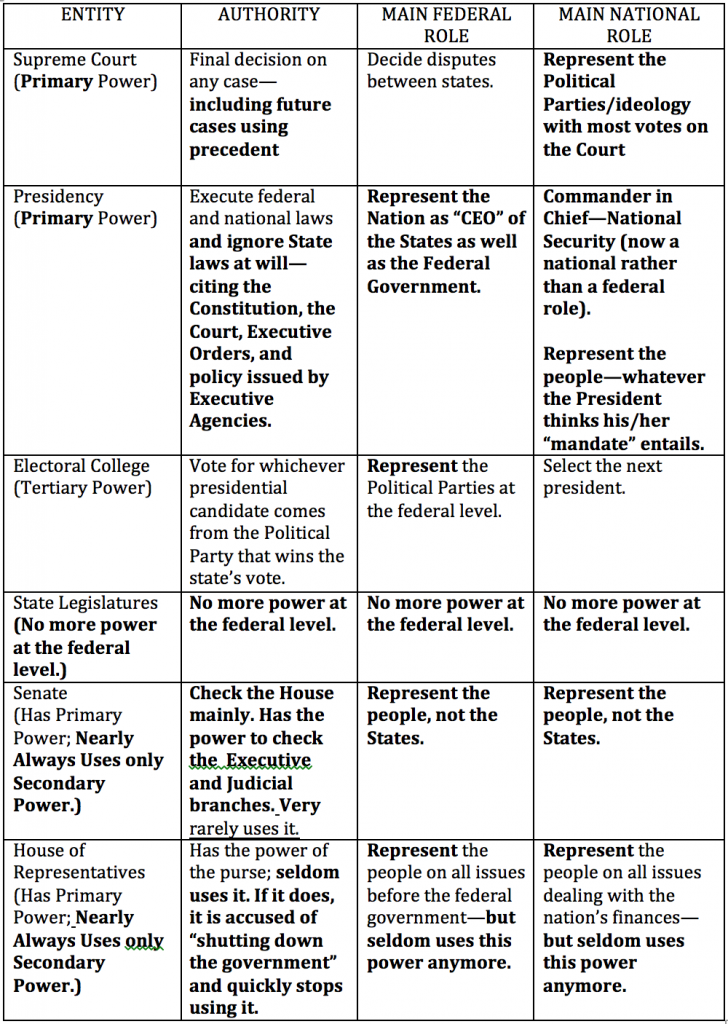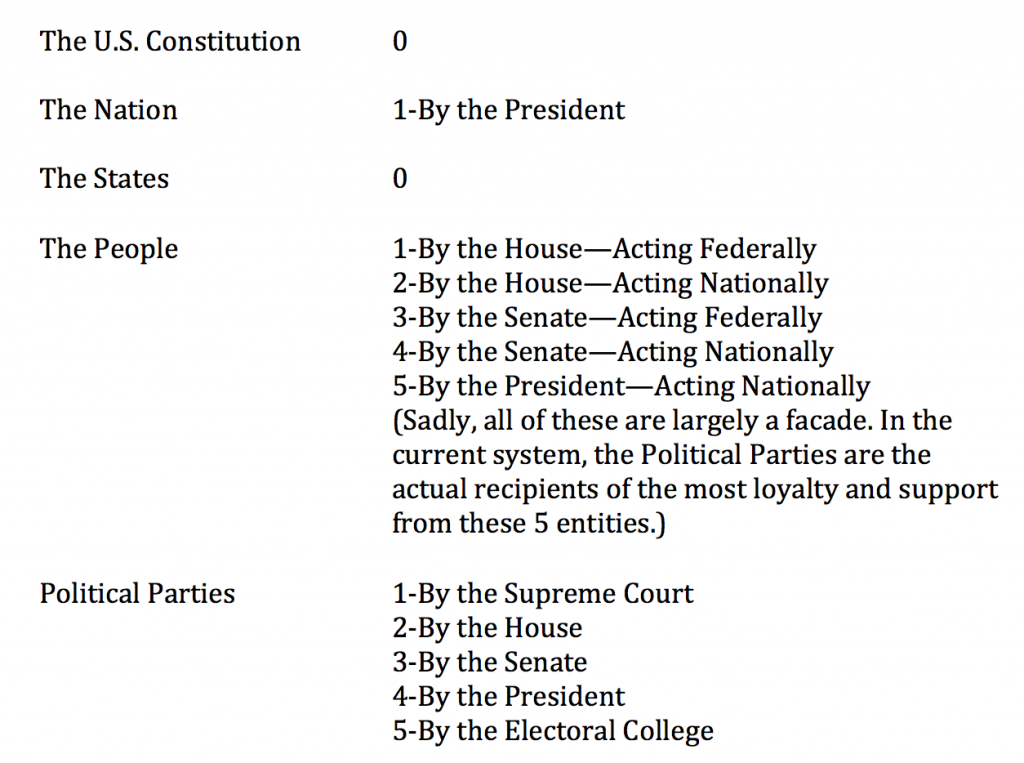How the Election Really Works
August 31st, 2016 // 1:24 pm @ Oliver DeMille
“Sometimes the wicked man undergoes a change for the better,
but the fool never does.” —Anatole France
Seen and Unseen
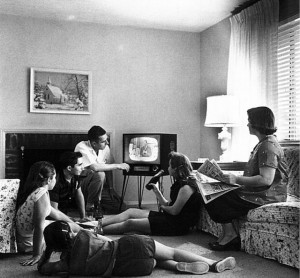 They’ve become part of our cultural “truth”. Yet both are myths. Lies, in fact:
They’ve become part of our cultural “truth”. Yet both are myths. Lies, in fact:
“Perception is reality.”
“It’s just business.”
Indeed, these two popular sayings are usually voiced precisely to justify doing something wrong. Or mean-spirited. Or both. The truth is that reality is reality; perception seldom is—especially in the age of modern media. And “business” is never a valid excuse for being unprincipled, no matter what the media tries to tell us.
For example, in the 2016 movie remake of Tarzan, the bad guy (a social-climbing bureaucrat whose role is to represent his European king in Africa) kidnaps John Greystoke’s wife Jane, tries to “seduce” her through manipulation and threats, and kills those who try to defend her. Then he sets out to sell her to Greystoke’s enemies. Not a nice man.
Perhaps the most poignant scene in the movie comes after a dinner where Jane refuses his advances and then leaves the room. Once she has departed, the kidnapper notices that her silverware isn’t properly placed on the plate—so he quickly remedies the situation, showing that he has the perfect table manners of the European royalty.
The irony couldn’t be more striking. Such perfect table manners in a man who is a slaver, murderer, thief, racist, and would-be rapist. He has all the appearances of nobility, but no actual nobility. Perception and reality are, in his case, polar opposites. He is the worst kind of degenerate—the kind who hides his decadence behind carefully polished surface appearances. He is Iago. Wickham. Tartuffe.
In this man’s case, perception is the opposite of reality. And to him the phrase “it’s just business” means corruption and debauchery are not only acceptable, but preferable—and routine.
Love and Freedom
The French playwright Moliere (“France’s Shakespeare,” as some literary experts argue) captured this all-to-human flaw in his most famous play, Tartuffe. This classic contains an important warning for today: The way most people gullibly accept the influences of media in modern life is a serious problem.
If any institution sets out to make perception seem like reality, and to justify all manner of questionable things in the name of “it’s just business”, it is modern media. From aggressive paparazzi stalkers to “gotcha” bullying in the name of investigative reporting, to exposés and even seemingly credible reporting that play to an agenda, in spite of available evidence – today’s media has, in large part, abandoned its role as the conscience and “watchdog” of society and become part of the bigger problem. Indeed, much of media is a contemporary Iago, daily whispering the wrong things in the ears of citizens and voters. Sadly, many people seem as willing to listen as Othello or Orgon. Moliere summarized:
“People whose own conduct is the most questionable are always readiest to criticize the behavior of others.”
But Shakespeare and Moliere aren’t done with their scathing critique. In both Othello and Tartuffe, the power of the villains is based on pretending to be loyal, credible, dedicated to the truth, always genuinely helping the people. But appearances can be deceiving.
Not that anything is wrong with real faith, true commitment to what’s good and right. To the contrary. As Moliere wrote: “I have wit enough to distinguish truth from falsehood. And as I see no trait in life more great or valuable than to be truly devout, nor anything more noble, or more beautiful, than a sincere piety, so I think nothing more abominable than a pretended zeal…”
A few journalists get it right. They truly serve us all by doing things the right way. But the overall field of media is too often overrun with pretenders—like Iago, Tartuffe, and their peers—doing business instead of journalism, emphasizing headlines, ratings, and sales rather than what really matters. In Orwell’s famous Animal Farm, for example, the media icon is pig- aptly named “Squealer.”
The only solution to such media agendas is a populace made up of citizens who think for themselves. “Love requires a firmness of mind,” as Moliere assures us. The same is true of freedom.
Swaying Words
Too often, especially during elections, voters let media spin guide them. Like the character Orgon, deeply caught in the web of Tartuffe’s lies, tells Cleante—who has pointed out that Orgon should be wiser, not so easily swayed:
“Brother, your advice is the best in the world. It is very rational, and I highly value it. But you must not fret if I don’t follow it.”
Seriously? How often do we listen to Wickham’s silver tongue even when we know inside that something is wrong? Why do we let Willoughby, dashing Willoughby, sway our minds? A smile, a frown, or the seemingly-credible assurance of a popular Network Anchor. We swoon and follow.
Why?
“How strange these humans be! They choose the path of fools, though they know it lead to ruin … Emotion rules their ways.”
In the Moliere play The Would-Be Gentleman, the characters heatedly debate whether M. Jourdain is a good man and should be accepted into their society. Some criticize him; others praise him. But one comment sways a number of people. Dorante simply describes Jourdain as:
“A very polite man.”
This is the high art of media spin. Use exactly the right words to convey a certain impression—one that convinces, and lasts. Yet media commentary on candidates is far from objective. It is almost always steeped in some agenda.
Success and Rules
Best-selling author Neil Pasricha noted that in his industry, writing books, there are three types of success:
- knowing that your book is excellent and helpful to people
- selling lots of books
- getting lots of praise from book reviewers and critics
He then wrote: “Here’s the catch: It is impossible to have all three successes.” If you can get one, great. If you can get two, wonderful. But he’s never seen anyone get all three, largely because if you achieve any two of these, they will get in the way of the third.
The election process is similar. If a candidate gets lots of votes and knows he/she is truly trying to improve the nation, it’s almost impossible to also get the support of the political media. You can aim for two, but if you aim for all three you’ll likely weaken the ones that really matter.
For this reason, what the media says about elections is often (usually) off on election night. Marketing experts Ries and Trout made it one of their famous 22 Rules of effective marketing that whatever the media says, it is always wrong in some way—and wise people know it and look for it. They take media reports with a grain of salt. Always.
In elections, specifically, the forecasters are notoriously inaccurate. Why? They pay attention to others in the media, not the masses. Studies show that people answer surveys and polls differently than they vote, so studying the actual intentions of the masses before an election has proven very difficult.
Wisdom or Wisdom
Pasricha also noted that common wisdom is often confusing:
- Birds of a feather flock together vs. Opposites attract
- Nothing ventured/nothing gained vs. Better safe than sorry
- You get what you pay for vs. The best things in life are free
- Good things come to those who wait vs. The early bird gets the worm
- The pen is mightier than the sword vs. Actions speak louder than words
In short, we don’t really understand how elections actually work. Sure, if they’re fixed, or manipulated, or rigged—that’s one thing. But a truly free election is nearly always a surprise. Madison called every free election a “peaceful revolution.” Not truly predictable. We have to wait for the people to actually vote to know what they’re really thinking.
This will probably be even more the case in an election where the two candidates (Hillary and Trump) are so hated by so many people. A lot of voters won’t cast a vote for either. We won’t know…until we know.
In this election, perception isn’t reality. Not even close.
Category : Aristocracy &Blog &Citizenship &Community &Culture &Current Events &Generations &Government &History &Independents &Information Age &Leadership &Liberty &Politics
A Truly Great New Book on Education
August 6th, 2016 // 1:33 pm @ Oliver DeMille
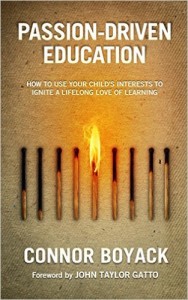 (A Review of Passion-Driven Education by Connor Boyack)
(A Review of Passion-Driven Education by Connor Boyack)
I have seen the future, and it is encapsulated in a new book: Passion-Driven Education by Connor Boyack. It will forever change how you think about your children’s education—and your own.
Okay, it doesn’t actually show us the future. But Passion-Driven Education is a masterpiece. It’s an idea whose time has definitely arrived.
The Past
Here’s how we got to this point. The old-style education of the 1950s through 2000s was based on rote memorization, multiple-choice standardized exams, bureaucratic presidential reports and programs like A Nation at Risk, No Child Left Behind, and Common Core, and a “big-business” educational mentality that focused on curriculum design (usually one-size-fits-all), teacher training, construction of school buildings, administrative budgets (sometimes increases, other years cuts), and a lot of politics thrown into the mix.
The educational bureaucracy managed to get its fingers into almost everything about education, except actually helping students learn—more effectively, with higher quality and true one-on-one help and individualized learning. A lot of teachers did the unheralded work of quality mentoring, but a majority of students fell through the cracks. Indeed, the emphasis was always on schooling, funding, and educating, while personal student learning was seldom a priority.
And great education was hardly ever mentioned. Mediocrity reigned.
The Present
Because of this baggage, right now education is at a fork in the road, and the old educational establishment is struggling to make sense of it. The fundamental problem is that since the GI Bill after World War II, the education industry has hitched itself entirely to job and career training. Before World War II, education was about raising future adults, citizens, and leaders. From Colonial America to Horace Mann in the 1850s and John Dewey in the first half of the 20th century, American education emphasized preparing the next generation to do as well or better than the current one.
But this all changed during the late 1940s and early 1950s: Schools turned their focus to job training. By the 1970s education was fully part of the labor sector—training young people, and middle-aged and older people as well, for jobs. Remove job-training programs and majors from today’s college campuses, and they’ll be ghost towns. High school is now largely focused on college or job prep as well.
The present challenge is that the economy has changed. Drastically. The United States is no longer in a perpetual growth economy. That distinction has shifted to China, India, and other parts of Asia. North America and Europe will most likely experience a slow- or negative-growth economy for many years ahead. Why? Simply because the Baby Boomer generation has now passed it’s peak buying years—it reached its apex in early 2007, and by 2008 it’s spending began to decrease. The economy responded with the Great Recession.
In short: If current trends continue, there will less demand for houses, products, and services for many years to come. As a result, the old economy is gone for good. A new economy, more globalized, more competitive, increasingly rough and tumble, is the new reality. This will last for at least three decades, according to the experts. Possibly five.
What passed as typical education for job- and career-training in the 1950s-2000s simply won’t work any more, at least not in North America or Europe. It will likely flourish in Asia; but most families in, say, Iowa or Wyoming or Virginia aren’t keen on relocating their young adults across the Pacific anytime soon.
All this boils down to a new reality: Unless something changes, people will buy fewer goods and services, so companies will hire less, jobs will be more scarce, and a lot more easily filled. Where does such a shift leave modern education, whose main focus is job training?
The answer is that education is now in a pickle. Most educators and schools (at all levels) are still using a teaching model very similar to what was used in the 1950s, and most of the educational establishment is refusing to change much—hoping that people won’t notice that diplomas and degrees just aren’t translating into lucrative jobs with good benefits like they once did. Expect more and more three-generation households, as young families find joblessness or underemployment incompatible with home ownership and consumer spending.
Past and Future Compared
Just to compare, the economy of The Employment Age (1945-2008) included the following main characteristics:
- Steady work (often with one company over the course of a career)
- Predictably rising pay
- 8-hour work days, 40-hour and 5-day work weeks
- Consistent growth of the middle class
- Each generation doing better financially than the last
(See more details on this era in, for example, The Future of Success by Robert Reich)
But we are now witnessing the rise of a new economic era. The emerging Age of High Risk is offering a different set of realities:
- Off and on work, lots of layoffs, turnover, and outsourcing
- Up and down income
- 12-hour work days for many who are lucky enough to be fully employed, 80-hour and 6-7 day work weeks
- Shrinking of the middle class, and growth of the elite and lower classes
- The next generation doing much worse financially than the last
The result is that the old model of education isn’t working for most people in the new economy. And this trend is only growing.
The Future
The next generation needs an education that will effectively prepare them for success in the new reality, the emerging new, global, high-risk, entrepreneurial economy of the 21st century. Anything less is a waste or a distraction. And since only a few schools are seeing the change and effectively doing something about it, a lot more parents need to get serious about education in these new economic realities.
Enter Connor Boyack. His book Passion-Driven Education is just what the doctor ordered. It is a realistic, practical, and well-thought-out call for a reboot of quality education. His message is timely and vital. His book accomplishes the following huge changes:
- It emphasizes personalized, individualized education that puts the student at the center of things—rather than administrators, bureaucratic planners, or the educational professorate. Think of it! The student as the centerpiece of education. This is both incredibly obvious and (given the current state of American education) truly revolutionary.
- It likewise puts learning—not schooling, not administration, not curriculum design/textbook publishing, not teacher training, not presidential educational programs and promises—but actual student learning at the forefront. This is tantamount to a mutiny from the typical modern education system.
- It then goes on to show that student interest, curiosity, passion, love of learning, and the innate enthusiasm to gain knowledge are not just afterthoughts—reserved for clubs, after school or personal time, or extracurricular activities—but the very crux of quality learning.
These three shifts are a masterful call for the kind of education that will actually work, that will put American learning at the forefront of education again—and that will prepare the rising generation for real success in the new economy.
Moreover, Boyack’s book also manages to get back to the heart of what education really is. Long before the focus was job training, education was about becoming. Becoming better: More effectively serving God, family, community, and nation. Education was about becoming your very best. It was about finding yourself, discovering your life purpose, and realizing you were born to serve other people.
This is a major part of the “passion” in passion-driven learning.
Consider the following passage from bestselling author Victor Villasenor about a girl he met who had once been sweet, kind, and service oriented, but after attending school for some time went through a drastic change:
“This girl had been completely educated away from her heart and soul! Her thinking, critical brain had become her only way of viewing the whole world!” (Beyond Rain of Gold, p. 330)
True passion-driven learning adds intellect to morality and the simple virtues, rather than replacing virtue and a heartfelt desire to serve with highbrow disdain for anything except credentialed sophistication, cosmopolitan values and careers, and intellectualism. Passion-driven learning is the real deal.
In all this, Boyack puts the “great” back into education. This is a 5-Star, Top Rate, Two Thumbs Up declaration on what education should be, what it can be, and what it needs to be in the years and decades ahead. Every parent in America should read this book. Every teacher should carefully study and internalize it. And every student should read it as a roadmap of what’s ahead. Passion-Driven Education is brilliant!
Category : Blog &Book Reviews &Community &Culture &Current Events &Economics &Education &Featured &Generations &History &Leadership
The Meme Election
August 3rd, 2016 // 9:44 am @ Oliver DeMille
“Some Americans are actually using Facebook to choose the President?”
—Meme
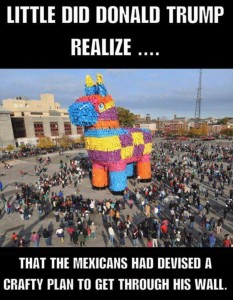 Some articles are deeply serious, others are informational, and still others ask an important question or share valuable history or principles. This one is meant to be fun. But it also has an underlying reality that is worth considering.
Some articles are deeply serious, others are informational, and still others ask an important question or share valuable history or principles. This one is meant to be fun. But it also has an underlying reality that is worth considering.
For decades the daily political cartoon in newspapers was the pinnacle of political satire in America. Today memes, vines, and jokes on social media have taken its place, and studying these genres tells us a lot about where the American populace stands on top issues.
For example, investment advisor Charles Sizemore recently noted that now we have two of the most hated political candidates in history—Trump and Hillary. This is mirrored by a popular online joke that goes something like this:
Hillary and Trump are in a boat that is sinking in the middle of the ocean. Who gets saved?
Answer: America
Whether dark humor like this offends or causes laughter—as it does with divergent audiences—it usually only goes viral if it reflects something that resonates, one way or the other. To be frank: This election has much of America baffled. Just plain baffled.
“Hillary Clinton and Donald Trump?” a number of people are asking incredulously. “Really? Those are the only real choices?”
The nation is amazed.
History and Choices
Another meme features a picture of Donald Trump and the caption:
“I don’t always run for president, but when I do, I try to offend as many potential voters as possible.”
Or compare this:
“No matter who you vote for, this election will be historic:
First female president: Hillary Clinton
First Latino president: Marco Rubio
First Jewish president: Bernie Sanders
First Canadian president: Ted Cruz
Last president: Donald Trump”
Some people will laugh at the “Canadian” reference to Cruz. Others will shake their head and call the whole thing tasteless. But the words: “Last President: Donald Trump”? Priceless. Some will agree. Others will adamantly disagree. But it’s worth a laugh. And it communicates something that a lot of people worry about.
Sometimes a certain meme hits really close to home. For example, one says:
“If Bernie Sanders is elected president, he’ll be the first socialist president elected since 2008.”
Ouch.
Another meme shows Senator Clinton with a strong look on her face and the caption:
“Silly Americans. Laws are for poor people.”
A number of the jokes and memes are truly distasteful. Others are downright disgusting. Researching political memes brought me a number of laughs, but the really bad ones made me shake my head in shame for our nation. At least in the days of political cartoons an editor had to sign off. I like the freedom of our current model, but at times people take it too far.
Shocking Ourselves
Overall, I don’t know if the memes, vines, and online jokes help our political discourse—or hurt it. Probably some of both. But I do believe that a few of them cleverly capture the nation’s mood in ways we seldom find in the mainstream media. For example, consider the following two memes:
1-A small boy is pictured, about to poke a butter knife into an electrical socket. He’s clearly going to get shocked. The caption reads:
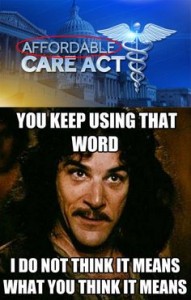 “Trump or Hillary? Top socket or bottom socket?”
“Trump or Hillary? Top socket or bottom socket?”
A lot of people are feeling exactly this way right now.
2-Donald Trump is standing next to a huge wall on the border with Mexico, and the wall is lined with gold and stamped with a huge T. The caption reads:
“Think I can’t get Mexico to fund the wall? Well I got the media to fund my campaign!”
Indeed.
Some memes are both sad and funny, like a picture of Jeb Bush with the caption:
“ONE CHILD LEFT BEHIND”
Another meme shows Donald Trump dressed like Biff from Back to the Future, shoving Jeb Bush (dressed as Marty McFly’s teenage dad) into a high school locker. Compare this to a meme with a picture of Nixon. He says: “I deleted 18½ minutes of footage. Hillary Clinton deleted thousands of emails. Who’s the crook now?”
Form Where You’re Standing
I won’t even get into the political vines. They can waste a lot of time, and YouTube is full of the political good, the bad, and the ugly. In fact, on the topic of the election, there is a lot of truly ugly. The memes are typically much tamer. And, the more I compared the two, the memes are generally better—funnier, and more effective. (The funniest of the vines I came across is the Trump/Star Wars Emperor dialogue, with keywords: “Star Wars: Interrupting Trump”.)
The truth is that the political cartoon genre, the idea of political satire that uses one image to cut right to the core of the matter—and forces us to see truths that we may feel but haven’t yet clearly articulated—can be very insightful.
One more:
A picture of Star Wars characters carries the caption:
How you see your candidate (picture of Jedi master Obi-wan Kenobi)
How you see their candidate (picture of Darth Vader)
What they’re both really like (picture of Jar Jar Binks)
The kernel of truth in this simple meme is sobering.
With memes, such satire reaches more of the younger generations than the older. But they can teach us all. And over time, I suspect they’ll become more influential.
An important question right now: How will memes and vines impact future campaigns? And what will they evolve into?
By 2020 they could significantly increase in influence. In fact, since Kanye West has already announced his 2020 candidacy for the White House, maybe we’ll see the full election on a real-time streaming reality show app. Keeping Up With the Candidates. Something like this—or worse—is coming, no doubt.
Category : Blog &Citizenship &Community &Constitution &Culture &Current Events &Featured &Generations &Government &History &Independents &Information Age &Leadership &Liberty &Politics
Are We Entering an Era of One-Term Presidents?
July 22nd, 2016 // 2:49 am @ Oliver DeMille
Loyalties and Addictions
 Many nations, and the global market as a whole, are moving from the Loyal Economy to an On-Demand Economy. (See Klaus Schwab, The Fourth Industrial Revolution, 2016, 72) This is just what it sounds like. Our societal focus is increasingly on what we want–not what we need, should want, or have already agreed to.
Many nations, and the global market as a whole, are moving from the Loyal Economy to an On-Demand Economy. (See Klaus Schwab, The Fourth Industrial Revolution, 2016, 72) This is just what it sounds like. Our societal focus is increasingly on what we want–not what we need, should want, or have already agreed to.
This shift is impacting work, business, management, leadership, professions, and even families, churches and communities in massive ways. It has already taken a significant toll on relationships in our modern society. Indeed, almost no part of human life has remained untouched by this momentous change.
Just think of all the ways damage can be caused by a shift away from loyalty, and changed to whatever someone wants instead, and you’ve got a pretty good indication of the problem. For example, as a society we have historically been known for being loyal customers—we either love or hate the Yankees, Cowboys, Lakers, etc., and many people have traditionally been very passionate about Ford or Chevy, West Coast or East Coast, City or Farm, New York Times or Wall Street Journal, Prada or Gucci, and so on.
As for Republican and Democrat, these attachments were often multi-generational, and as zealously maintained as one’s religion. For a number of people, these labels (GOP or Democrat) defined “who they really were as people” more than any other feature.
But in the Digital Age we’re losing many of these connections. A lot of people now switch allegiance to sports team based on how the best clubs are playing this season, and we change “favorite” recording artists or television shows almost as often as we change our socks nowadays. We press “Like” one day, and don’t press it the next. Just follow the Twittersphere—changing loyalties is new a national hobby. Or addiction.
The Line
With the endless options of the Internet constantly streaming in front of us, it’s not surprising that many customers—most customers in fact—consistently try out new options. Why not? Maybe the next one will be better.
The same is true of many companies. It used to be that good employees were given numbered pins each year or decade—to show how long they’d been at the company. The ideal was once to work your whole life with one organization, move up the ranks a little or a lot, and retire in the same company and town where you started your first job. The whole company threw a party, and you were presented with a gold watch, an engraved silver pen, or another memento of your long-term loyalty.
Today few companies exhibit such loyalty. Some, in fact, routinely purge upper-level management in order to replace more expensive employees with cheaper, younger models who are decades from earning a pension. The laws have made it much easier to carry your retirement savings with you from company to company, and a lot of people are constantly on the lookout for a better job elsewhere. There are popular apps dedicated to this habit.
Given today’s technology, and the nimbleness big organizations must somehow try to exhibit in order to remain relevant, such changes aren’t surprising. In fact, they may simply be the new way of things, the new normal. The old is always being replaced with the new. This week. In fact, in the news cycle Monday’s “crises” and “tragedies” often go unmentioned by Thursday.
Thus it isn’t shocking that our political leanings are going through an era of upheaval as well. During modern periods of economic and cultural stability, a majority of voters stick with the parties. Whether you like this approach or not, it’s usually the reality. Such majorities may be “silent” most of the time, but on election day they vote like the experts knew they would. They toe the party line.
Parties or Menus
We have seen this kind of stability erode a great deal since 2006. The iconic memory of 9/11, followed by the failure to find weapons of mass destruction in Iraq or win the wars in Iraq or Afghanistan easily and quickly, threw the electorate for a loop, and the Great Recession that followed moved us decisively away from political stability—at least for a while. China, Russia, the Middle East, North Korea, fluctuating prices, an economy that never seems to recover, and so many other things contribute to a growing sense of chaos, and of things getting worse.
Indeed, elections seem to get crazier and crazier. Predictions by the top experts, and the masses of talking heads, are now routinely wrong.
This isn’t driven by a cycle, however, meaning that we can’t chalk it all up to “a phase” the nation is going through before it reverts back to its traditional, normal behaviors. Cycles and trends do sometimes explain things that happen, but this time something more is going on. The rise of nearly-ubiquitious digital mobility is still in its infancy, and it is quickly restructuring politics (along with marriage, family, community, education, career, business, the economy, etc.).
Voters are less and less likely to be Loyalty Voters, emotionally attached to one party that stands for their culture, their beliefs, their family traditions. Indeed, in a world where more and more people are routinely questioning their birth culture and family traditions, they’re not likely to let loyalties based on these things get in the way of change.
Specifically, we are entering a Pragmatic Era in politics, where people want on-demand government. They want a menu of options to choose from, not a political party and its bureaucracy. They don’t really want to choose between candidates. They want a little of what one candidate has, but without the rest of his ideas. They want some of what another candidate promotes, minus his personal views, or his stand on [fill in the blank…]. They like what they hear from one candidate on one day, but disagree with what she says the next.
Response Government
It’s not so much a targeted electorate where the candidates try to win over the biggest special interests—like it has been for the past two decades. What’s emerging now is, to repeat, a growing clamor for on-demand politics. Voters want to unbundle government. They want to be able to select “yes” items and “no” items from every candidate running for high office.
In other words, they want Washington to live in the Digital Age. They want to directly email—or, better still, text—presidential candidates and have an on-going dialogue with them, and then continue the dialogue after the president is elected.
“I liked your speech yesterday at Georgetown, except for the part on naval upgrading. What actually needs to happen is…”
Moreover, they want the President to answer their email.
“Thanks, Amy. I see your point. I’m meeting with the Joint Chiefs later today and I’m going to tell them your recommendation—and order them to do it. They really need it. Good thing you’re on our side and sent me that email.”
Today’s voters want the government to respond the way Amazon does. Immediately. In fact, they want to be able to sign up for the President’s Prime service—free answers within the hour, and nearly-immediate government implementation of whatever you tell the Oval Office to do.
“Get your policy implemented by Tuesday at 8 p.m., if you order it in the next 8 hours and 41 minutes. To get it by Monday at 8 p.m., pay an extra $3.99 and click here…”
As a result of this shift in voter expectations from their government (and the fact that government is still stuck in the 60s–or maybe the 70s–ways of doing things), hardly anyone is truly happy with any election anymore. Presidents Bush and Obama may well be the last loyalty-backed presidents. Indeed, barring a major military threat that unites the nation against a common enemy and brings back a loyalistic approach, most future presidents may well be one-termers.
That’s worth repeating. We may be entering an epoch of one-term presidencies. We’ve already seen the voters moving this way with their seeming schizophrenia in presidential versus Congressional elections. They routinely put one party’s candidate in the White House and simultaneously fill the Congress with the opposing party.
Solutions
Again, what the voters really want is a truly on-demand system, where they can elect national leaders and direct their actions issue by issue, “no” on this, “yes” on that—preferably with a click of their computer—er, smartphone. This is leading in the direction of more democracy, specifically a more democratic system built around online voting. And, honestly, most modern Americans see this idea as excellent, obvious, and overdue.
In response, I have two words:
- Federalist.
- Papers.
If you have studied them in depth, you know exactly what I mean.
But most people haven’t.
And that means we’re in for a wild political ride just ahead. It might contain a series of one-termer presidents (the nation swinging pendulum-like to and fro, then back again, over and over), a serious party shakeup with a new dominant national political party (or two), or it might be something even more surprising.
Whatever is coming, there is a widespread sense that it’s big. And we don’t even have Steve Jobs to walk out on a black stage in his black t-shirt and announce the future. If he were still around, he’d tell us to hold on to our hats, because this flight into the Era of populism, globalism, voter pragmatism, and digital-age on-demand revolution is just beginning. And the only thing we know for sure is that it’s going to get bumpy.
(Solution: It’s more important than ever for regular people to deeply study the core principles of freedom! The politicians and “experts” aren’t going to fix this for us—they’re the ones piloting the current chaos. For a beginning reading list of core freedom principles—and audios to go with each— join Black Belt in Freedom)
Category : Aristocracy &Blog &Citizenship &Community &Constitution &Culture &Current Events &Education &Featured &Foreign Affairs &Generations &Government &History &Independents &Information Age &Leadership &Liberty &Mission &Politics &Producers &Statesmanship &Technology
Why Populism? by Oliver DeMille
July 6th, 2016 // 7:46 am @ Oliver DeMille
Pendulum Swinging
 We’ve heard a lot about populism during the election, and we’re going to hear a lot more. Why? Because the elite media is in serious shock.
We’ve heard a lot about populism during the election, and we’re going to hear a lot more. Why? Because the elite media is in serious shock.
They expected Hillary Clinton’s success, but the rise of both Trump and Sanders has astonished them.
Result: they’re writing and talking a great deal about “populism,” and the “dangers” it brings to our nation.
By the way, these tend to be the same journalists and media professionals who consistently tout the United States as a “democracy,” not a “republic” or “democratic republic.”
They promote “democracy, democracy, democracy” as the greatest governmental system ever, and then act shocked and worried when populism shows up to an election.
The irony is that populism is simply what happens when more voters than usual get actively involved in the process. In other words, America engages in populism during the years it acts the most democratic. Why are the elites concerned?
Answer: They like the kind of “democracy” where the masses are consistently swayed by the media—where expert elites tell the populace what to believe, and the electorate votes accordingly. This is what most members of the elite class actually mean when they use the word democracy.
Personally, I like Francis Fukuyama’s definition. He said:
“‘Populism’ is the label that political elites attach to policies supported by regular citizens that they don’t like.”
Funny how that sentence is written. Does is mean the political elites don’t like the policies? Or that they don’t like the regular citizens? I think it means the latter. But maybe not. Perhaps it means both the policies and the regular citizens.
Fukuyama notes that populist voters sometimes choose poorly, but “elites don’t always choose correctly either.” Very true. And in our current historical context, the worst-case scenario would be another elitist choice for president. Elites have increased in power far too much in the past three decades, and it’s time for the pendulum to swing back to the power of the people.
I. 3 Positive Developments
Here’s the “good news,” so to speak, about the current rise of populism:
#1
As Fukuyama also pointed out, this wave of populism is weakening both of the major political parties. The Democrats are losing large segments of their working class base and moving even more to the party of “a bunch of special interest groups,” while Republicans are almost violently split between the “big business crowd” and working class voters. Indeed, working class populists from both parties are now behaving like a formidable force.
#2
On a structural note, the framers of the U.S. Constitution didn’t want the president to be elected by mass vote. This is why they established the Electoral College—which originally worked with each state sending its representatives, rather than the people voting in a mass presidential election at all.
Fortunately, the people usually sense it when things are out of kilter. The framers put the people in charge of electing the House of Representatives in large part because the House controlled the nation’s money. But since the House seldom uses its power of the purse anymore like it should, and the White House now has the de facto say over money, the people are using their power to choose a president—like they once would have selected members of the House.
This structural shift if ironic: The masses, divided by congressional district (which is exactly how they oversaw the purse strings under the original Constitution), will select the president and largely determine the future spending of our nation. In other words, if the House shirks its job, the people switch their populism to the branch of government they think will do their will.
The elites see it happening, and they can’t stand it.
#3
Maybe that’s the best thing about this election. Regardless of what you think of Sanders or Trump, both candidates have thrown a serious wrench into the way elites view the world. They are reeling. They aren’t in charge of this election like they assumed they would be—not so far, at least.
Make no mistake, they’ll get their bearings again and get back to their agenda—to grow government and increase the power, wealth, and influence of the elite class. They always do. This won’t keep them down for long.
But populism seems to be growing. Sanders and Trump didn’t create this momentum, they just benefited from it. Populist elections changed the power of Congress in 2010 and again in 2014. In 2016 we’ll find out if populism makes it to the White House as well. Again, however you feel about the specific candidates, the rise of populism is a positive in a nation where elites control far too much.
2: A DEEPER LOOK AT THE CONSTITUTIONAL STRUCTURE (THEN VS. NOW)
To see just how populism is important, let’s delve a bit deeper into the structural change to our governmental system. The framers established the following three branches and six entities to participate in the federal level:
Note that the following received direct representation under the provisions of the original Constitution: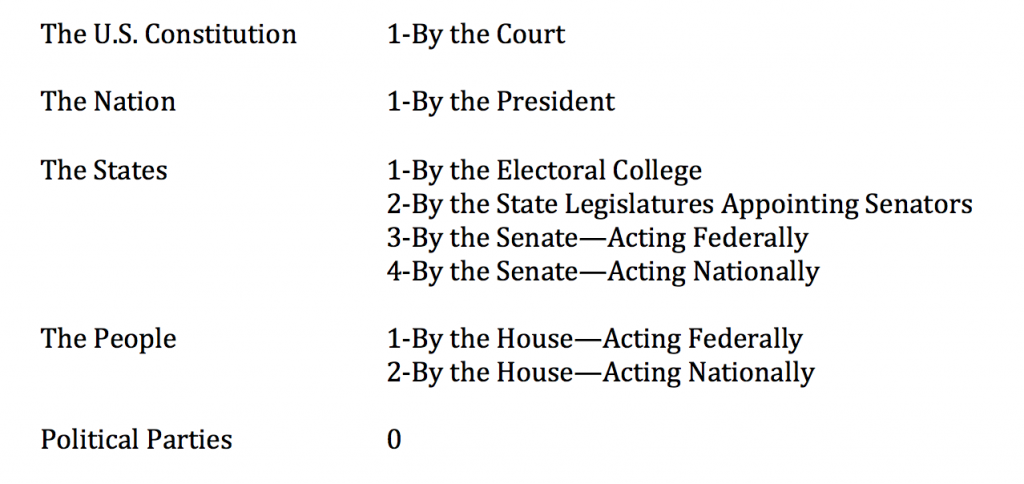
This entire arrangement was carefully thought out by the framers. They knew that the key to lasting freedom was to ensure that the States didn’t lose their power to the federal/national government, so they put in four protections against this (listed above). All were wiped out by the poor decision to adopt the 17th Amendment in 1913. (Ironically, this was ratified during an era of populism.)
Our oversized and overblown national government and corresponding loss of freedoms since that time are the natural result. The best solution would be to repeal the 17th Amendment and restore the proper balance of State and Federal powers.
The following chart shows how the government currently operates. Note that it is very different than the original constitutional arrangement:
THE STRUCTURE TODAY
(Items underlined are changes from the original Constitution
that are destructive to freedom.)
Look at how this has changed our governmental structure of representation:
Did you notice in all this that at the time of the American founding the primary entities of federal/national government were the House and the Senate, while the Court and Presidency were secondary? Compare that to now: the Presidency and Court act like primary branches of government, while the House and Senate act like secondary levels of government.
What the founders called “legislative primacy,” meaning that the people’s elected representatives in Congress had the final say on things through the purse strings, has been replaced by appointed officials in the Court and a huge Executive bureaucracy exerting the final say on most things.
Huge changes. All bad!
For The People
Now, if you’ve followed this article this far, congratulations! Here is the main point, the thesis, the reason for reading this and thinking about it:
Populism is attempting to correct the course of the American ship. Specifically, the populist elections of 2010 and 2014 both attempted to put the House and Senate back on track representing the people—not the political parties.
And the populist uprising of 2016 (among both Democrats and Republicans) is also arguing for the presidency to represent the people again, not the political parties. It’s not as good or as effective as repealing the 17th Amendment—not by a long shot—but at least the electorate is trying.
The voters (some knowingly, and most of them just by following their gut) are attempting to swing things back in the direction of government “by, of, and for” the people—instead of government “by, for, and of” the economic and power elites and their political party establishments.
Populism probably can’t get the ship all the way safely into port, but right now the people are at least trying to get things going in the right direction. If the voters keep at it, and don’t give up—and if they keep winning major elections—this new beginning can eventually be turned in the direction of a real and lasting solution.
Stay tuned…
Category : Aristocracy &Citizenship &Community &Constitution &Culture &Current Events &Economics &Education &Entrepreneurship &Featured &Foreign Affairs &Generations &Government &History &Independents &Information Age &Leadership &Liberty &Politics &Statesmanship


